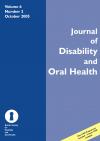Journal of Disability and Oral Health

- Cover Date:
- October 2003
- Print ISSN:
- 1470-8558
- Electronic ISSN:
- 1754-2758
- Vol:
- 4
- Issue:
- 2
Editorial
I feel very privileged to have been asked to write this editorial and to have the opportunity to share with you my thoughts and experiences as the mother of an intellectually impaired son. My son Dick is 54 years old and suffered a birth injury. I do not use the term learning difficulties, because this has not been my experience with him. I think he has sometimes suffered from wrong approaches to learning – I feel that I have not always been able to enter his thought processes and be able to stimulate his interest. When this has succeeded it has been very positive for us both. I have learned that the intellectually impaired have three main characteristics- negativity, perserveration and low selfesteem. When asked a question the answer is most usually – No! This does not always mean no as we understand it. It may mean that the question is not understood, that he does not wish to answer the question and that you are invading his space, among many other possibilities. Perseveration is the practice of repeating the same processes and attitudes when they are often no longer appropriate. Low self esteem is, I believe, the result of a sense of social exclusion and of not feeling part of the society in which he lives. A disabled person like Dick feels rather like an asylum seeker, not part of the alien society in which he finds himself, but nevertheless needing to be made to feel part of that society and to be treated as everyone else In support of this view I quote from a letter in the Belfast Telegraph of 13 Febr uary 2003. Not without Feelings “I would urge people to look at disabled people as human beings and not as an object of curiosity who may need help because they have a disability. Just because I am in a wheelchair does not mean I do not have feelings. Don’t look at me with pity. Look as you would at an able-bodied person. Look at the person not the disability.” How much more might this apply to intellectually impaired people who may not have such capacity for self expression but whose feelings are just as strong and vibrant? One of the most interesting and important things I have learned about people with disabilities is the range of abilities of each person. I quote: “Current definitions of learning disability point to the importance of the holistic approaches to understanding individual need which look at several aspects of a person’s functioning within their own life and relationships” (World Health Organisation, 1992). “Many people with learning difficulties have personality attributes and other qualities which contribute to a fulfilling life in spite of their impairments” (British Journal of Psychiatry, 2000). This year, 2003 is the European Year of People with Disabilities. BSDH Clinical Guidelines for Oral Health Care of People with Learning Difficulties state that it is clear that, whatever the nature or degree of disability, people with learning difficulties have the same rights as all other members of Society. This is most praiseworthy. It is stressed that people have a right to participate in decisions that affect their lives. In this important year for all disabled people may I make a plea for another approach to this question? I have gained the opinion, over many years that society wishes to do everything possible for the disabled. I believe that there is a great need for people with disabilities to be enabled to do things not only for themselves but also for society. I would sug gest that an educative programme be made available for society as a whole, so that each individual learns about disabled people as full members of society. This should begin with an understanding of their own attitude towards those with impairments, their own prejudices and how to try to communicate in a meaningful way. May I conclude with a quotation from Harry Potter and the Goblet of Fire: “...he needs to understand. Understanding is the first step to acceptance and only with acceptance can there be recovery”. This is a two way process. Society must learn to understand and accept intellectually impaired people and they in turn must try to learn to understand and so accept society, thereby leading to the lessening of the low self- esteem and of feelings of social exclusion. If this could be achieved perhaps the world might be a better place for us all. Mrs Joan Freeman
- Article Price
- £15.00
- Institution Article Price
- £15.00
- Page Start
- 50
- Page End
- 50
- Authors
- Joan Freeman
Articles from this issue
- Title
- Pg. Start
- Pg. End
- Do health care professionals refer housebound people to dental services? Referral behaviours and characteristic factors
- 51
- 57
- Perceived dental needs and experiences of preventive dental care of patients attending a paediatric cardiology clinic
- 64
- 68
- The oral and dental health of children in special national schools in the Eastern Regional Health Authority Area, Ireland 1999/2000
- 69
- 76
- An investigation into the dental health of children attending two special day schools in South Warwickshire
- 79
- 84
- British Society for Disability and Oral Health European Year of Disability Special Award – Primary Care Setting
- 104
- 104
